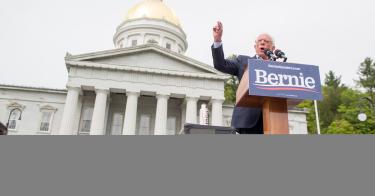Usually, it’s conservatives who complain of media bias. But now progressives are starting to beef about the mainstream media’s coverage of Democratic presidential aspirants.
Specifically, they’re upset about the perceived focus on a handful of white, male candidates — Joe Biden, Bernie Sanders, Pete Buttigieg and the now-fading Beto O’Rourke. This, they say, gives short-shrift to progressive favorites like Kirsten Gillibrand, Elizabeth Warren, and Kamala.
What makes a candidate newsworthy is, of course, obscure. A compelling life story, a clever Tweet, or a strong quarter of fundraising can all attract media attention. But, progressive activists believe that the dominance of Biden, Bernie, Beto, and Buttigieg is evidence of sexism, racism, or (at best) superficial judgments regarding electability.
According to Politico, early coverage of O’Rourke’s entry into the race “frustrated many Democratic operatives — particularly women — who viewed it as an example of the double standard at work in the historically diverse presidential field.”
Progressives have long drawn a bright line between campaign advertisements paid for by private citizens and corporations on one side, and journalism on the other. The former — they tell us — is motivated by greed and private interest; the latter is concerned with truth and the general welfare.
Leah Daughtry, a former Democratic National Committee official, stated at a recent presidential forum: “Racism and sexism are part of the fabric and the fiber and the founding of our country ... and the way that the [Democratic] candidates are being treated, it just reminds you of that. We're not past it.”
Even if more benign motives are at play — for instance the media’s reliance on “horse race” coverage — the media’s focus on a few frontrunners has troubling implications. Joe Biden, who has opened a 30-point lead on his closest competitor, garners nearly as much airtime as the rest of the candidates in the crowded Democratic field combined. With little oxygen left, it is hard to see how another candidate will catch fire and challenge him.
Even though Biden’s reception by the press has been lukewarm, the 2016 GOP primary demonstrated that so-called “earned media” can solidify support behind a frontrunner, even if the media’s impression of that candidate is not altogether positive. As the last GOP primary showed, even negative press may be better than no press at all, especially in a very crowded field.
While progressives are now voicing concern over the degree to which media coverage can influence an electoral contest, none has yet drawn the conclusion that seems so obvious to many on the right: the only possible counterweight to inevitable media bias is political speech funded by private citizens.
For candidates that fall outside the media spotlight, campaign advertisements, glossy mailers, and whistle-stop tours — all of which cost money — are necessary to stay on the stage. Political donations allow candidates like Kamala Harris and Elizabeth Warren to buy what newscasters and producers give other candidates for free. In this way, campaign donations and expenditures can dampen the effect of media bias.
Yet, oddly, progressive politicians are pushing legislation that would make it more difficult for all political candidates to raise and spend money on their own campaigns. Indeed, the first bill introduced by the new Democratic majority in the House of Representatives would impose sweeping new limits on political spending.
Limiting the amount of money in politics, many progressives claim, would level the political playing field by checking the influence of big corporations and rich oligarchs. But what about the big corporations that own television networks and internet platforms? And what about the rich individuals who own newspapers and cable news stations? Tightly limiting private political spending would leave the very media outlets progressives now complain about not just the loudest, but the only, voices in the public square.
Making it harder for political candidates and political action committees to raise money and get their message out will actually increase the relative influence of this rarified caste of elites. Their decisions about who to interview, what campaign events to cover, and how much airtime each candidate deserves would be of even greater consequence with fewer competing counter-narratives.
Progressives have long drawn a bright line between campaign advertisements paid for by private citizens and corporations on one side, and journalism on the other. The former — they tell us — is motivated by greed and private interest; the latter is concerned with truth and the general welfare. The former should be viewed with suspicion and tightly circumscribed; the latter should be fêted and insulated from critique (at least from its rightwing detractors).
Whether the left will be able to pivot back to this Manichean frame once their erstwhile media allies are again firing in the same direction is hard to say.
This piece originally appeared on Fox News



